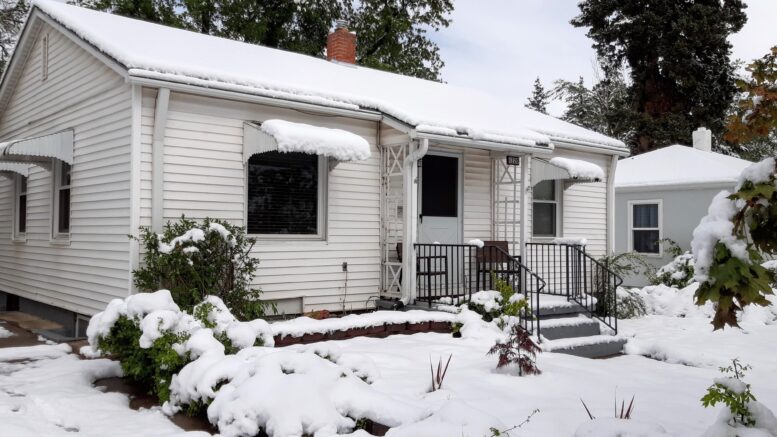After a decade-long period in which businesses have bemoaned the worsening of Colorado’s legal climate, members of one profession — appraisers — are fighting back and having at least initial success during the 2024 legislative session.
The House Business Affairs & Labor Committee on Thursday passed a bill that would give real-estate appraisers more protection against what industry leaders described as a rising number of lawsuits nationally accusing them of negligence. Far from just offering legal help to small businesses against actions typically initiated by banks and larger entities, House Bill 1085 could help to stem personnel losses in an aging industry that will be vital to Colorado’s efforts to boost the stock of housing statewide.
HB 1085, sponsored by Republican Rep. Lisa Frizell of Castle Rock and Democratic Rep. Judy Amabile of Boulder, would set a five-year statute of repose to bring claims against appraisers, with the clock starting when an appraisal is completed and given to a client. It follows similar laws that have been passed in 14 other states, with most of them establishing statutes of reposes between three and five years.
An “aging and shrinking” sector
While lawsuits against appraisers — the professionals who assess property values for home sales or during divorce proceedings — used to be rare, there have been at least 400 such lawsuits nationally over the past decade, said MJ Carroll, president of the Colorado Coalition of Appraisers. And while appraisers must maintain their records for five years under professional certifications, a good number of these lawsuits come later than that, when they may have retired or may not have access to work product any longer.
There are 3,000 licensed appraisers in Colorado, but with the profession aging — the average appraiser is in their mid- to late 50s — and expenses rising, a full 16% did not seek renewal of their certification in 2024, said Warren Boizot, co-owner of BLG Appraisal Group. That led Frizell to describe the profession as “aging and shrinking,” and her co-sponsor to plead with the business committee to give help to a sector where leaders said that 70% of companies contain five or fewer people.
“To have for an indefinite amount of time the threat of a lawsuit hanging over your business is pretty daunting. And we are losing appraisers because of that,” Amabile said. “We want to make sure they survive. Without them, all transactions will grind to a halt.”
Committee members voted 7-4 to advance HB 1085 to the House floor where it could be debated as soon as this week, with the three Republican members joining Amabile and three other Democrats in supporting it. But the opposition of four majority-party Democrats, as well as opposition from trial lawyers and the Colorado Mortgage Lenders Association, leaves the future of the bill far from certain.
Arguments against boosting protections for appraisers
Mike Flynn, a mortgage attorney and member of the legislative and regulatory action committees for CMLA, said even if they may be increasing nationally, such lawsuits against appraisers remain “very infrequent.” And of the few that have happened in Colorado, many have been tossed out as frivolous or won by appraisers, noted Thomas Neville, an attorney at Ogborn Mihm LLP.
Mortgage lenders are barred under law from having appraisers on their staff, to maintain independence of valuation of property from the decision to offer a loan, Flynn noted. And while appraisers must submit reports before closing of a property sale, it often isn’t until a property goes into default and foreclosure years later, triggering another appraisal, that mistakes necessitating legal action are discovered in the original appraisal, Flynn argued.
Frizell and Amabile attempted to link the high costs of appraisers’ liability insurance to both the increasing incidence of lawsuits and the decreasing workforce in the sector. J.P. Nisley, a Grand Junction business owner and president of the Colorado chapter of the Appraisal Institute, noted he must carry about $1 million in liability insurance annually and that his premiums will rise if he is sued, whether the case even advances to court.
But Rep. Javier Mabrey, a Denver Democrat who voted against HB 1085, said the bill’s backers didn’t effectively make the case for linking insurance costs to these infrequent lawsuits. And with appraisers appearing to win these lawsuits, he doesn’t believe the situation is one into which the Legislature should step, he said.
Part of a troubling legal climate
“I also am about standing with the little guy,” Mabrey said. “I just was not convinced this is a unique problem.”
Business leaders consider the legal climate as a whole to be a problem, however.
Colorado’s ranking for its lawsuit climate in the U.S. Chamber of Commerce Institute for Legal Reform survey fell from eighth-best in 2010 to No. 21 in 2019. Since 2013, the Legislature has increased potential penalties for small businesses accused of discrimination, widened the definitions of discrimination and sexual harassment and put new restrictions around how employers must advertise jobs and consider applications for those open positions.
HB 1085 offers a rare opportunity for a sector to lessen the chances of lawsuits being filed against it. But if it is to succeed, backers must convince skeptical Democrats that the legal climate is having a significant impact in the exodus of appraisers from the field.
